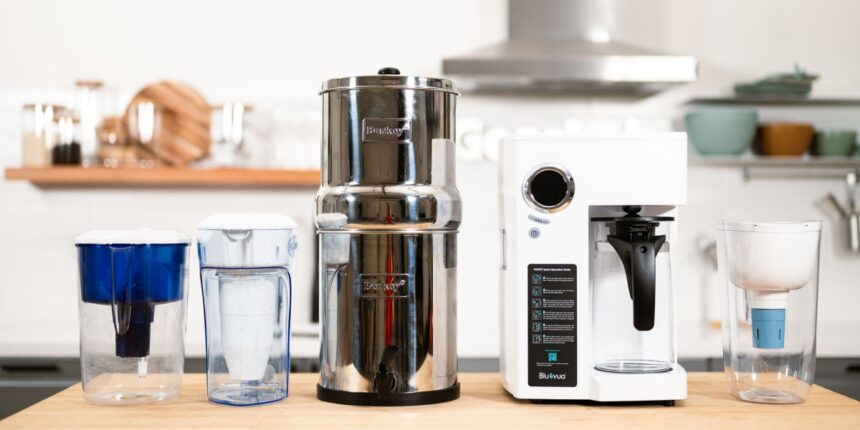When it comes to choosing a water filter for your home, there are several options available. Some popular types include pitcher water filters, faucet-mounted filters, reverse osmosis systems, and whole house water filters. Each type has its own advantages and considerations to keep in mind when making your decision. Let’s take a closer look at these different options and what sets them apart.
Types of water filters for home use
When it comes to choosing a water filter for your home, there are several options available. Some popular types include pitcher water filters, faucet-mounted filters, reverse osmosis systems, and whole house water filters. Each type has its own advantages and considerations to keep in mind when making your decision. Let’s take a closer look at these different options and what sets them apart.
Key features to consider when choosing a water filter
When choosing a water filter for your home, like waterplant.pk it’s important to consider key features that will meet your specific needs. These features include filtration technology, filter lifespan and replacement cost, installation requirements and compatibility with your existing plumbing system, flow rate, contaminant removal capabilities, and certification by reputable organizations such as NSF International. By considering these factors, you can ensure that you select the right water filter for your home to provide clean and safe drinking water.
Pitcher Water Filters
Pitcher water filters are a popular and affordable option for home use. These filters are easy to use and require no installation. Simply fill the pitcher with tap water, and the filter will remove contaminants as you pour. While pitcher filters may not be as effective as other types of filters in removing certain contaminants, they offer a convenient solution for improving the taste and odor of your drinking water. Some top brands include Brita, PUR, and ZeroWater.
Pitcher water filters: Pros and Cons
Pitcher water filters offer convenience and affordability for improving the taste and odor of tap water. They are easy to use, requiring no installation or plumbing adjustments. However, pitcher filters may not be as effective as other types in removing certain contaminants. It’s important to note that they have a limited capacity and need regular filter replacements. Despite their limitations, pitcher water filters remain a popular choice for households looking for a simple and budget-friendly solution to improve their drinking water quality.
Top brands and models of pitcher water filters
When it comes to pitcher water filters, there are several top brands and models to choose from. Some popular options include the Brita Everyday Pitcher, PUR Classic Water Filtration System, and ZeroWater Pitcher. These brands offer a range of features such as different filter capacities, improved taste and odor removal, and easy-to-use designs. Consider your specific needs and budget when selecting the best pitcher water filter for your home.
Faucet-Mounted Water Filters
Faucet-mounted water filters are an easy and convenient way to filter your tap water. They attach directly to your faucet, allowing you to switch between filtered and unfiltered water with a flip of a switch. Installation is simple, requiring no tools or plumbing modifications. These filters typically use activated carbon or other filtration media to remove impurities such as chlorine, sediment, and bacteria from your drinking water. They are also cost-effective compared to other types of water filters and require minimal maintenance.
Faucet-mounted water filters: Installation and maintenance
Faucet-mounted water filters are incredibly easy to install and require no tools or plumbing modifications. Simply attach the filter directly to your faucet, and you’re ready to go. Maintenance is also a breeze, with most filters only requiring periodic replacement of the filter cartridge. This ensures that you always have clean and filtered water at your fingertips with minimal effort.
Benefits of using faucet-mounted water filters
Faucet-mounted water filters offer several benefits for your home. They provide instant access to clean and filtered water directly from your tap, eliminating the need for bottled water. These filters are easy to install and require minimal maintenance, making them a convenient choice. With a faucet-mounted filter, you can enjoy great-tasting water while reducing contaminants and improving the overall quality of your drinking water.
Reverse Osmosis Systems
Reverse osmosis systems are highly effective in removing contaminants from water. These systems use a semipermeable membrane to filter out impurities, including bacteria, viruses, chemicals, and heavy metals. They provide clean and purified drinking water for your entire household. However, it’s important to note that reverse osmosis systems can be more expensive and require professional installation and regular maintenance.
How reverse osmosis systems work
Reverse osmosis systems work by using a semipermeable membrane to remove impurities from water. The water is pushed through the membrane under high pressure, allowing only pure water molecules to pass through while trapping contaminants. This process effectively removes bacteria, viruses, chemicals, and heavy metals from the water, providing clean and purified drinking water for your home.
Advantages and disadvantages of reverse osmosis systems
Reverse osmosis systems have several advantages, such as effectively removing contaminants from water, including bacteria and chemicals. They also provide a convenient and reliable source of clean drinking water. However, they can be expensive to install and maintain, and the process can waste a significant amount of water. Additionally, some minerals may also be removed during the filtration process.
Read more: Catwalk Confidence: Channeling Runway Styles in Your Branded Outfits
Conclusion
In conclusion, choosing the right water filter for your home is essential for ensuring clean and safe drinking water. Consider factors such as filtration capabilities, installation and maintenance requirements, and your specific needs. Pitcher filters are convenient but have limited capacity, while faucet-mounted filters are easy to install but may not filter as effectively. Reverse osmosis systems offer thorough filtration but can be costly. Whole house filters provide comprehensive purification but require professional installation. Ultimately, make an informed decision based on your priorities and budget to enjoy clean water throughout your home.




